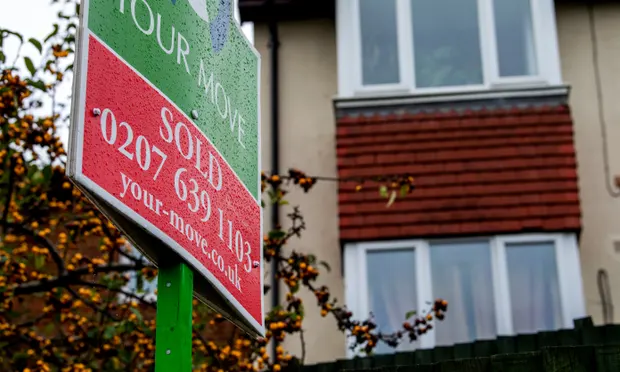Property prices in the UK fell for the fourth month in a row in December, the longest run of declines since 2008, according to Nationwide.
Annual house price growth also slowed sharply as the year drew to a close, to the lowest rate since mid-2020, with all regions of the country affected, according to the building society’s monthly survey.
The average price of a property fell by 0.1% month on month to £262,068 – a much smaller drop than in the previous two months – which left prices 2.5% lower than their August peak, after taking seasonal effects into account.
The annual growth rate cooled to 2.8% in December from 4.4% in November, Nationwide said. This is the lowest since July 2020, when it was 1.5%.
Jeremy Leaf, a north London estate agent and a former residential chair of the Royal Institution of Chartered Surveyors, said: “The drop in house prices is not surprising considering the sharp rise in the cost of living and especially interest rates. Prices may soften further as concerns about job security increase and uncertainty will remain until mortgage payments are seen to stabilise.
“However, the housing market continues to be supported by strong employment, lack of stock and lender forbearance, which are reducing the risk of mortgage defaults and preventing a larger fall in house prices.”
While the housing market is expected to cool further next year and some experts are forecasting sharp declines in house prices of up to 12%, Robert Gardner, Nationwide’s chief economist, is predicting a more modest drop in values of about 5%.
“The main factor that would help achieve a relatively soft landing … is if forced selling can be avoided, and there are good reasons to be optimistic on that front,” he said. “Most forecasters expect the unemployment rate to rise towards 5% in the years ahead – a significant increase but this would still be low by historic standards. Moreover, household balance sheets remain in good shape.”
Matthew Thompson, the head of sales at the estate agents Chestertons, said while cash buyers and “seasoned buyers” tried to get purchases done in December, “first-time buyers and second steppers have been more hesitant and decided to observe how the market might develop in the New Year”. He added that appraisals had fallen compared with previous months, which will lead to fewer properties coming on to the market during the first quarter of 2023.
Source: The Guardian


